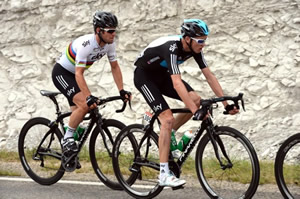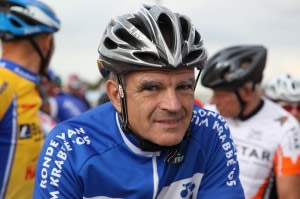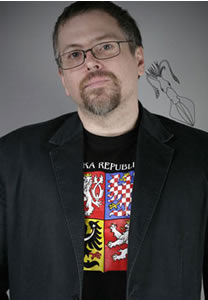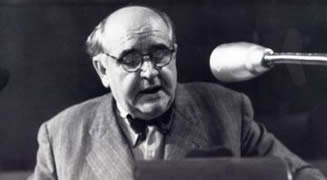Bij de Tour de France

Uit: Das Rennen (Vertaald door Susanne George)
„Nach rechts. Anstieg über 5 Kilometer zum Causse Méjean. Ich habe mich ein Stück nach hinten fallen lassen; ich bin in der Mitte des Feldes.
Durcheinander. Ein Fahrer schaltet, trifft daneben, fliegt fast über seinen Lenker, flucht. Zwanzig Fahrer vor mir, eine ganze Straße voll. Ich erkenne Lebusque, ein Segelflugzeug zwischen den Staren.
Bei Anstiegen reißen sofort die schlimmsten Löcher auf, ich muss hindurch. Schwankend halte ich nach Durchlässen Ausschau. Panik, dass sie mich allein lassen, noch spüre ich meine Pedale nicht. Ich tippe ein Hinterrad an, ich schlingere, ein anderer stößt sich von mir ab, ich lande im Straßengraben, kein platter Reifen. Flitz flitz. Zwei Fahrer weg. Mit einigen wenigen Tritten fahren sie aus meinem Rennen davon. Reilhan und Guillaumet. Die echten Klassefahrer – zwischen den Rennen mache ich mir nur selbst etwas vor. Sie sind sofort gut weggekommen. Am Berg zu attackieren ist äußerst effektiv, aber auch das Schwerste, was es gibt. Bahamontes, Fuente konnten das zwanzigmal hintereinander, wie rammelnde Kaninchen. Alle Kletterer guten Durchschnitts warnen einander vor dieser Sorte von Männern. Nicht dranhängen. Doch dranhängen? Dann ziehen sie noch mal an, sie lassen dich am Gummiband krepieren. Doch währenddessen werde ich namenlos Zehnter. Ich muss mich damit abfinden. Ich kann nur tun, was ich tue, und so weitermachen.
Ich bin nun vorne in unserem halb ausgerissenen Feld gelandet. Dritte Position. Dort bleibe ich; die beiden vor mir fahren schnell genug. Nach einer Weile wird mir klar, wer sie sind: Lebusque und Kléber, nebeneinander. Lebusque auf den Pedalen stehend mit einer riesigen Übersetzung, aber trotzdem gleichmäßig. Kléber sitzend. Halb neben mir stampfend, ächzend, aber überraschend, Barthélemy.
Allmählich finde ich einen Rhythmus. Klettern ist ein Rhythmus, ein Rausch, man muss die Proteste seiner Organe beschwichtigen.“

Lees verder “Tim Krabbé, Lion Feuchtwanger, Ivo Victoria, Vladimir Majakovski, Clemens Haipl”


